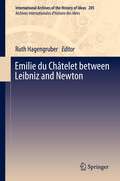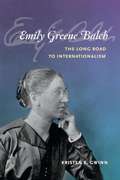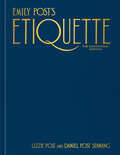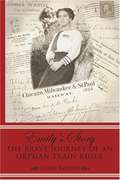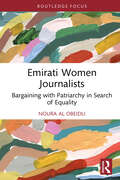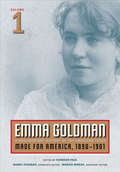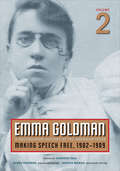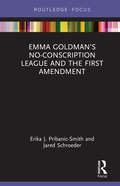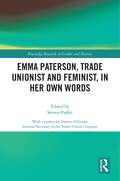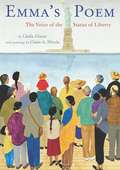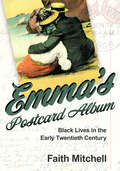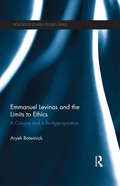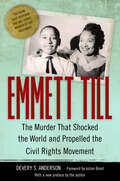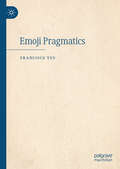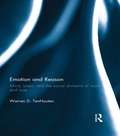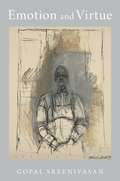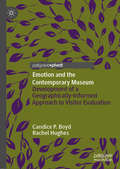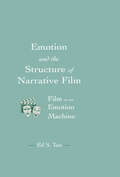- Table View
- List View
Emilie du Châtelet between Leibniz and Newton
by Ruth HagengruberEmilie du Châtelet was one of the most influential woman philosophers of the Enlightenment. Her writings on natural philosophy, physics, and mechanics had a decisive impact on important scientific debates of the 18th century. Particularly, she took an innovative and outstanding position in the controversy between Newton and Leibniz, one of the fundamental scientific discourses of that time. The contributions in this volume focus on this "Leibnitian turn". They analyze the nature and motivation of Emilie du Châtelet's synthesis of Newtonian and Leibnitian philosophy. Apart from the Institutions Physiques they deal with Emilie du Châtelet's annotated translation of Isaac Newton's Principia. The chapters presented here collectively demonstrate that her work was an essential contribution to the mediation between empiricist and rationalist positions in the history of science.
Emily Greene Balch: The Long Road to Internationalism
by Kristen E. GwinnA well-known American academic and cofounder of Boston's first settlement house, Emily Greene Balch was an important Progressive Era reformer and advocate for world peace. Balch served as a professor of economics and sociology at Wellesley College for twenty years until her opposition to World War I resulted with the board of trustees to refusing to renew her contract. Afterwards, Balch continued to emphasize the importance of international institutions for preventing and reconciling conflicts. She was awarded a Nobel Peace Prize in 1946 for her efforts in cofounding and leading the Women's International League for Peace and Freedom (WILPF). In tracing Balch's work at Wellesley, for the WILPF, and for other peace movements, Kristen E. Gwinn draws on a rich collection of primary sources such as letters, lectures, a draft of Balch's autobiography, and proceedings of the WILPF and other organizations in which Balch held leadership roles. Gwinn illuminates Balch's ideas on negotiated peace, internationalism, global citizenship, and diversity while providing pointed insight into her multifaceted career, philosophy, and temperament. Detailing Balch's academic research on Slavic immigration and her arguments for greater cultural and monetary cohesion in Europe, Gwinn shows how Balch's scholarship and teaching reflected her philosophical development. This first scholarly biography of Balch helps contextualize her activism while taking into consideration changes in American attitudes toward war and female intellectuals in the early twentieth century.
Emily Hahn on China: Chiang Kai-Shek and China Only Yesterday, 1850–1950
by Emily HahnChinese history is brought to vivid life by the “quintessential New Yorker narrator” and author of The Soong Sisters, who lived in China from 1935 to 1941 (The New York Times). Chiang Kai-Shek: As the head of the Nationalist Party, Chiang led the Republic of China for over two decades from 1927 through the Japanese invasion, World War II, and the civil war that ended with a Communist victory in 1949. After defeat, he retreated with his government to Taiwan, where he continued to lead as president of the exiled Republic of China. Published in 1955, this in-depth biography by legendary New Yorker writer Emily Hahn examines Chiang’s childhood in southern China, his relationship with revolutionary Sun Yat-Sen, his rise to power, and his battles with the Japanese Imperial Army and Communist forces led by Mao Zedong, as well as chronicling his marriage to the glamorous, American-educated Soong May-ling (the youngest of the influential siblings portrayed in Hahn’s The Soong Sisters), who converted her husband to Christianity and helped him enact social reforms. Casting a critical eye on Sino-American relations, Hahn sheds new light on a complex leader, who was one of the most important global political figures of the last century. “[Hahn] writes . . . with an impassioned warmth . . . colorful reading . . . An irreparable past is echoed in the forlorn note sounded here.” —Kirkus Reviews China Only Yesterday, 1850–1950: With an insider’s knowledge of Chinese culture and politics, Hahn delivers a sharply observant book that illuminates a century of China’s tumultuous history. Her “absorbing” history begins with the Treaty of Nanking, which gave Western powers access to five of China’s eastern ports, and covers the British colonization of Hong Kong, the rise of the tea trade, the Opium Wars, the arrival of Christian missionaries, the Boxer Rebellion, the revolutionary movement led by Sun Yat-Sen, the overthrow of the Ch’ing Dynasty, the escalating tensions between the Communist and Nationalist parties, and the Japanese invasion on the eve of World War II—which Hahn experienced firsthand (Kirkus Reviews). The final chapters cover the civil war, which ended with Chairman Mao’s formation of the People’s Republic of China and Chiang Kai-shek’s retreat to Taiwan. “[An] observant, satisfying book.” —Kirkus Reviews
Emily Post's Etiquette, The Centennial Edition
by Lizzie Post Daniel Post SenningThis centennial edition of Emily Post&’s classic guide to etiquette has been completely rewritten with up-to-date and comprehensive advice on the need-to-know manners, customs, and best practices of today.For the past one hundred years, Emily Post has been America&’s definitive source for how to navigate—and enhance—every social interaction. In an increasingly diverse and intersectional world, the need for a trusted primer on how to put people at ease and treat others with confidence and kindness has never been greater.Lizzie Post and Daniel Post Senning—the great-great grandchildren of Emily Post and co-presidents of The Emily Post Institute—provide a fully updated and relatable guide. From advice on entertaining, table manners, and using titles and pronouns, to personal and professional communication etiquette, this stylish and essential reference provides thoughtful guidance on how to do it all well. Rooted in a foundation of consideration, respect, and honesty, this edition continues the Post family legacy of upholding traditions while moving forward with the times. The book covers: Etiquette classics like table manners, gift-giving, thank-you notes, greetings and introductions, and everyday conversationHow to be a good host and a good guest, from handling invitations and setting yourself up for success to plus-ones and dealing with mishaps Tech etiquette including video meetings, parties and classes, and how to politely handle devices, home security, and AI Managing hard times, from what to say (and what not to say), to the tradition of condolence notes and how to offer support following a death, miscarriage, or tragedyTipping practices in the age of rideshares, tough times, and ever-prominent payment screens.This book also includes handy reference guides for each chapter that make it easy to find the Posts&’ most searched for content, like a gender-free attire guide, a soup-to-nuts entertaining chart, sample invitations, and more.With Emily Post's Etiquette, The Centennial Edition you&’ll have everything you need to build successful relationships in all aspects of life as you move through your world with confidence and ease.
Emily's Story: The Brave Journey of an Orphan Train Rider
by Clark KidderIt seems incomprehensible that there was a time in America s not-so-distant past that nearly 200,000 children could be loaded on trains in large cities on our East Coast, sent to the rural Midwest, and presented for the picking to anyone who expressed an interest in them. That s exactly what happened between the years 1854 and 1930. The primitive social experiment became known as placing out, and had its origins in a New York City organization founded by Charles Loring Brace called the Children s Aid Society. The Society gathered up orphans, half-orphans, and abandoned children from streets and orphanages, and placed them on what are now referred to as Orphan Trains. It was Brace s belief that there was always room for one more at a farmer s table. The stories of the individual children involved in this great migration of little emigrants have nearly all been lost in the attic of American history. In this book, the author tells the true story of his paternal grandmother, the late Emily (Reese) Kidder, who, at the tender age of fourteen, became one of the aforementioned children who rode an Orphan Train. In 1906, Emily was plucked from the Elizabeth Home for Girls, operated by the Children's Aid Society, and placed on a train, along with eight other children, bound for Hopkinton, Iowa. Emily's journey, as it turned out, was only just beginning. Life had many lessons in store for her lessons that would involve overcoming adversity, of perseverance, love, and great loss. Emily's story is told through the use of primary material, oral history, interviews, and historical photographs. It is a tribute to the human spirit of an extraordinary young girl who became a woman a woman to whom the heartfelt phrase there s no place like home, had a very profound meaning.
Eminent Elizabethans: Rupert Murdoch, Prince Charles, Margaret Thatcher & Mick Jagger
by Piers BrendonWhat links Margaret Thatcher, Rupert Murdoch, Prince Charles and Mick Jagger? Each have illuminated our Elizabethan age in their own, inimitable, way.Margaret Thatcher - the first female Prime Minister, who dedicated herself with messianic zeal to breaking the mould of post-war British politicsRupert Murdoch - the billionaire media mogul whose empire, built on an ethical void, has polluted the channels of communication from London to Sydney, from New York to New GuineaPrince Charles - the royal dilettante whose erratic exploits shook the throne and put his own succession to it at riskMick Jagger - lead singer of the Rolling Stones, who embodied the sixties counter-culture of sex and drugs and rock 'n' roll yet aspired to be a gentleman and accepted a knighthood at the behest of Tony Blair.The sequel to Brendon's bestselling Eminent Edwardians, Eminent Elizabethans is written in the same witty, ironic and irreverent style and reveals how each one played out a major theme in the new Elizabethan medley. Each portrait vividly and vitally captured through pungent anecdote, piquant quotation and mordant commentary. In short, these brilliant miniatures are as entertaining as they are illuminating.'Excellent' Guardian'Entirely refreshing' Daily Mail'A delight' Daily Express
Emirati Women Journalists: Bargaining with Patriarchy in Search of Equality (Routledge Focus on Journalism Studies)
by Noura Al ObeidliThis book presents a rare investigation of the media landscape and gender dynamics in Emirati newsrooms, with a socio-cultural focus on the influence of tribal patriarchalism in determining Emirati women’s role as newsmakers.Shedding light on the stories of 40 Emirati and Arab expat journalists, including pioneer Emirati women journalists, the book offers insight into how these journalists construct gender differences and identity and how this influences their everyday attitudes, conversations, routines, and journalistic practices. The empirical study is supplanted with ethnographic explanations of the newsroom norms and journalistic practices from the author, who used participant observation inside two major news centres in Abu Dhabi and Dubai to understand the socio-cultural factors that shape the lives of Emirati and Arab expat journalists, their thoughts and beliefs about the media environment in the Emirates, and their opinions on authoritarian political control, censorship, and outdated media law.This book will interest students and scholars of journalism and journalistic practice, media policy, international journalism, gender studies, and Middle East studies.
Emissions, Pollutants and Environmental Policy in China: Designing a National Emissions Trading System (Routledge Contemporary China Series)
by Bo MiaoAs the world's biggest polluter, the environmental challenges that China faces in controlling its airborne emissions are crucial, not only to its own population in terms of tackling the severe domestic air pollution, but also to the planet as it faces calls from the international community to accept its responsibilities in cutting greenhouse gases. Deteriorating air quality clearly shows that China’s current environmental regime is unsuited to either tackle the rampant domestic air pollution or contribute fairly to international climate action. As such, this book explores the feasibility of applying a national emissions trading system to control multiple air pollutants in China. It begins with an outline of the existing emissions management system and goes onto explore whether a national emissions trading system is a viable choice to combat China’s conventional air pollutants. To this end, there is an in-depth analysis of the two pilot sulphur dioxide emissions trading programs in Taiyuan and Jiangsu, as well as an examination of emissions trading schemes in the US and EU. Finally, the book discusses the key design elements of a multi-pollutant cap-and-trade scheme that addresses both conventional air pollutants and greenhouse gasses. This book will be of great interest to students and scholars interested in the fields of environmental studies, Chinese politics and environmental law. It will also be invaluable to policy makers in the field.
Emma Goldman, Vol. 1: A Documentary History of the American Years, Volume 1: Made for America, 1890-1901 (Emma Goldman Ser. #Vol. 1)
by Emma Goldman Candace FalkEmma Goldman: A Documentary History of the American Years reconstructs the life of Emma Goldman through significant texts and documents. These volumes collect personal letters, lecture notes, newspaper articles, court transcripts, government surveillance reports, and numerous other documents, many of which appear here in English for the first time. Supplemented with thorough annotations, multiple appendixes, and detailed chronologies, the texts bring to life the memory of this singular, pivotal figure in American and European radical history. Volume 1: Made for America, 1890-1901 introduces readers to the young Emma Goldman as she begins her association with the international anarchist movement and especially with the German, Jewish, and Italian immigrant radicals in New York City. From early on, Goldman's movement through political and intellectual circles is marked by violence, from the attempted murder of industrialist Henry Clay Frick by Goldman's lover, Alexander Berkman, to the assassination of President William McKinley, in which Goldman was falsely implicated. The documents surrounding these events illuminate Goldman's struggle to balance anarchism's positive gains and its destructive costs. This volume introduces many of the themes that would pervade much of Goldman's later writings and speeches: the untold possibilities of anarchism; the transformative power of literature; the interplay of human relationships; and the importance of free speech, education, labor, women's freedom, and radical social reform.
Emma Goldman, Vol. 2: A Documentary History of the American Years, Volume 2: Making Speech Free, 1902-1909 (Emma Goldman Ser. #2)
by Emma Goldman Candace FalkEmma Goldman: A Documentary History of the American Years reconstructs the life of Emma Goldman through significant texts and documents. These volumes collect personal letters, lecture notes, newspaper articles, court transcripts, government surveillance reports, and numerous other documents, many of which appear here in English for the first time. Supplemented with thorough annotations, multiple appendixes, and detailed chronologies, the texts bring to life the memory of this singular, pivotal figure in American and European radical history. Volume 2: Making Speech Free, 1902-1909 extends many of the themes introduced in the previous volume, including Goldman's evolving attitudes toward political violence and social reform, intensified now by documentary accounts of the fomenting revolution in Russia and the legal opposition toward anarchism and labor organizing in the United States. Always an impassioned defender of free expression, Goldman's launch of her magazine Mother Earth in 1906 signaled a desire to bring radical thought into wider circulation, and its pages brought together modern literary and cultural ideas with a radical social agenda, quickly becoming a platform for her feminist critique, among her many other challenges to the status quo. With abundant examples from her writings and speeches, this volume details Goldman's emergence as one of American history's most fiercely outspoken opponents of hypocrisy and pretension in politics and public life.
Emma Goldman’s No-Conscription League and the First Amendment
by Jared Schroeder Erika J. Pribanic-SmithEmma Goldman’s Supreme Court appeal occurred during a transitional point for First Amendment law, as justices began incorporating arguments related to free expression into decisions on espionage and sedition cases. This project analyzes the communications that led to her arrest—writings in Mother Earth, a mass-mailed manifesto, and speeches related to compulsory military service during World War I—as well as the ensuing legal proceedings and media coverage. The authors place Goldman’s Supreme Court appeal in the context of the more famous Schenck and Abrams trials to demonstrate her place in First Amendment history while providing insight into wartime censorship and the attitude of the mainstream press toward radical speech.
Emma Hamilton and Late Eighteenth-Century European Art: Agency, Performance, and Representation (Routledge Research in Gender and Art)
by Ersy ContogourisThis book offers a renewed look at Emma Hamilton, the eighteenth-century celebrity who was depicted by many major artists, including Angelica Kauffman, George Romney, and Élisabeth Vigée-Le Brun. Adopting an art historical and feminist lens, Ersy Contogouris analyzes works of art in which Hamilton appears, her performances, and writings by her contemporaries to establish her impact on this pivotal moment in European history and art. This pioneering volume shows that Hamilton did not attempt to present a coherent or polished identity, and argues instead that she was a kaleidoscope of different selves through which she both expressed herself and presented to others what they wanted to see. She was resilient, effectively asserted her agency, and was a powerful inspiration for generations of artists and women in their own search for expression and self-actualization.
Emma Paterson, Trade Unionist and Feminist, In Her Own Words (Routledge Research in Gender and History)
by Steven ParfittEmma Paterson was a pioneer of trade unionism for women. In her short life, she set up a League dedicated to that cause, edited a newspaper to publicise it and travelled the UK working for it. Her spoken and written work addressed issues still with us today, from the gender pay gap to domestic labour, and those thankfully consigned to history, such as whether women should be able to vote or find clothes appropriate to industrial work.Emma Paterson, Trade Unionist and Feminist, In Her Own Words brings together the major works that comprise Emma Paterson’s written output, offering a unique insight into the struggles and concerns of women working in the workshops, factories, shops and homes of Britain’s Industrial Revolution. This book includes a long biographical chapter from the editor, a preface from Frances O’Grady, first woman general secretary of the Trades Union Congress, and then an annotated selection of Emma Paterson’s most important works, from her time as a young activist to her last days as an overworked editor and union leader.This book will appeal to scholars and students of the history of Britain, of its women workers, of industrial, labour and publishing history. It addresses broader questions of class and gender, the interconnections that exist between them and the silences that often accompany them.
Emma y las otras señoras del narco
by Anabel HernándezEste libro forma parte del largo recorrido periodístico de Anabel Hernández dentro del complejo mundo del crimen organizado en México, así como de su incesante búsqueda por entender los diversos componentes de los cárteles de la droga, los cuales tienen sumida a la nación desde hace décadas en una espiral de violencia en la que todos los días son explotadas, desaparecidas o asesinadas decenas de personas inocentes, muchas de ellas del sexo femenino. Desde su bestseller Los señores del narco (2010), éste es quizás el acercamiento más íntimo a la cúpula del narcotráfico, un detrás de cámaras de lo que ocurre en el multimillonario negocio criminal. En Emma y las otras señoras del narco la autora recorre el velo y muestra las pulsiones más profundas que hacen a los narcos buscar poder y dinero a toda costa. La autora de El traidor (2019), multigalardonada y reconocida internacionalmente como experta en temas de narcotráfico, una vez más gira la mesa del tablero y ofrece al lector un análisis casi antropológico de los capos de la droga y su entorno más cercano desde una nueva óptica: el mundo de sus mujeres. En estas páginas desfilan personajes como Emma Coronel y otras esposas de importantes narcotraficantes, una ex Miss Universo, y algunas de las actrices, cantantes y conductoras de televisión más reconocidas y aplaudidas en México, tanto del pasado como de la época actual. Madres, esposas y amantes. Mujeres que se amoldan a las reglas machistas de sus amos y bailan ante ellos -en privado, fiestas u orgías- la danza de los siete velos, y lo hacen sobre los cadáveres de los miles que han sido víctimas de los mismos hombres a quienes deleitan con su cómplice presencia a cambio de dinero, joyas y propiedades. Con el rigor investigativo que la caracteriza, Anabel Hernández, a través de entrevistas realizadas a testigos de los hechos, lleva al lector a las reuniones familiares, fiestas y alcobas de diversos narcotraficantes donde ocurren las historias de amor, compra y venta de placer, incesto, ambición, traición y venganza. Un mundo hasta ahora desconocido.
Emma's Poem: The Voice of the Statue of Liberty
by Linda GlaserGive me your tired, your poorYour huddled masses yearning to breathe free...Who wrote these words? And why? In 1883, Emma Lazarus, deeply moved by an influx of immigrants from Eastern Europe, wrote a sonnet that was to give voice to the Statue of Liberty. Originally a gift from France to celebrate our shared national struggles for liberty, the Statue, thanks to Emma's poem, slowly came to shape our hearts, defining us as a nation that welcomes and gives refuge to those who come to our shores. This title has been selected as a Common Core Text Exemplar (Grades 4-5, Poetry)
Emma's Postcard Album: Black Lives in the Early Twentieth Century (Atlantic Migrations and the African Diaspora)
by Faith MitchellBCALA 2023 Outstanding Contribution to Publishing Citation Award winnerThe turn of the twentieth century was an extraordinarily difficult period for African Americans, a time of unchecked lynchings, mob attacks, and rampant Jim Crow segregation. During these bleak years, Emma Crawford, a young African American woman living in Pennsylvania, corresponded by postcard with friends and family members and collected the cards she received from all over the country. Her album—spanning from 1906 to 1910 and analyzed in Emma's Postcard Album—becomes an entry point into a deeply textured understanding of the nuances and complexities of African American lives and the survival strategies that enabled people “to make a way from no way.” As snippets of lived experience, eye-catching visual images, and reflections of historical moments, the cards in the collection become sources for understanding not only African American life, but also broader American history and culture. In Emma's Postcard Album, Faith Mitchell innovatively places the contents of this postcard collection into specific historic and biographical contexts and provides a new interpretation of postcards as life writings, a much-neglected aspect of scholarship. Through these techniques, a riveting world that is far too little known is revealed, and new insights are gained into the perspectives and experience of African Americans. Capping off these contributions, the text is a visual feast, illustrated with arresting images from the Golden Age of postcards as well as newspaper clippings and other archival material.
Emmanuel Levinas and the Limits to Ethics: A Critique and a Re-Appropriation (Routledge Jewish Studies Series)
by Aryeh BotwinickEmanuel Levinas and the Limits to Ethics highlights how radically different Jewish ethics is from Christian ethics, and the profound affinities that subsist between Jewish ethics and philosophical and political liberalism. The philosophy of Emmanuel Levinas has captured the imagination of a global constituency who take his absolutizing of ethical demands and his assigning primacy to ethics over all other branches of inquiry in his mapping of Western philosophy to be indicative of a major re-ordering of both personal and cultural identity. It is this re-ordering, they believe, that would restore greater wholeness and value to human life. In this book, Aryeh Botwinick takes issue with both the theoretical analysis that Levinas engages in, and the practical ethical import that he draws from it. Arguing that what Levinas has to say about both skepticism and negative theology can be used to re-route his argument away from the avowed aims of his thought, this book will be of great interest to students and scholars of Jewish Studies, Ethics and Philosophy.
Emmett Till: The Murder That Shocked the World and Propelled the Civil Rights Movement (Race, Rhetoric, and Media Series)
by Devery S. AndersonEmmett Till: The Murder That Shocked the World and Propelled the Civil Rights Movement offers the first, and as of 2018, only comprehensive account of the 1955 murder, the trial, and the 2004-2007 FBI investigation into the case and Mississippi grand jury decision. By all accounts, it is the definitive account of the case. It tells the story of Emmett Till, the fourteen-year-old African American boy from Chicago brutally lynched for a harmless flirtation at a country store in the Mississippi Delta. Anderson utilizes documents that had never been available to previous researchers, such as the trial transcript, long-hidden depositions by key players in the case, and interviews given by Carolyn Bryant to the FBI in 2004 (her first in fifty years), as well as other recently revealed FBI documents. Anderson also interviewed family members of the accused killers, most of whom agreed to talk for the first time, as well as several journalists who covered the murder trial in 1955. Till's murder and the acquittal of his killers by an all-white jury set off a firestorm of protests that reverberated all over the world and spurred on the civil rights movement. Like no other event in modern history, the death of Emmett Till provoked people all over the United States to seek social change. Anderson's exhaustively researched book was also the basis for the ABC miniseries Women of the Movement, which was written/executive-produced by Marissa Jo Cerar; directed by Gina Prince-Bythewood, Tina Mabry, Julie Dash, and Kasi Lemmons; and executive-produced by Jay-Z, Jay Brown, Tyran “Ty Ty” Smith, Will Smith, James Lassiter, Aaron Kaplan, Dana Honor, Michael Lohmann, Rosanna Grace, Alex Foster, John Powers Middleton, and David Clark. For over six decades the Till story has continued to haunt the South as the lingering injustice of Till's murder and the aftermath altered many lives. Fifty years after the murder, renewed interest in the case led the Justice Department to open an investigation into identifying and possibly prosecuting accomplices of the two men originally tried. Between 2004 and 2005, the Federal Bureau of Investigation conducted the first real probe into the killing and turned up important information that had been lost for decades. Anderson covers the events that led up to this probe in great detail, as well as the investigation itself. This book will stand as the definitive work on Emmett Till for years to come. Incorporating much new information, the book demonstrates how the Emmett Till murder exemplifies the Jim Crow South at its nadir. The author accessed a wealth of new evidence. Anderson made a dozen trips to Mississippi and Chicago over a ten-year period to conduct research and interview witnesses and reporters who covered the trial. In Emmett Till, Anderson corrects the historical record and presents this critical saga in its entirety.
Emoji Pragmatics
by Francisco YusEmoji is everywhere—on messaging apps, social networking sites, and even in offline media like billboards, films, and printed ads. While there is a substantial existing bibliography on emojis, it often fails to address their functions and interpretations in purely pragmatic terms, specifically focusing on their impact on inferential strategies for both the emojis themselves and accompanying texts. Existing books on this topic tend to focus on the semiotic aspects or visual impact of emojis, rather than their crucial role in interpreting the messaging text or social media post to which they are attached, as well as the way they communicate their own meanings when used in isolation (so-called naked emojis). This book is original in analysing the pragmatic roles that emojis play in online communication, the additional information they convey, and the role of context in their successful interpretation. The book also argues that, despite the apparent differences between words and images, emojis perform similar functions and are inferred in similar ways to words, with the aid of context. Additionally, the book dedicates several chapters to demographic variables (age, gender, ethnic origin, personality, etc.), the role of “interface affordances” in emoji use, and thematic areas where emojis are frequently found: humour, advertising/marketing, politics, law, and health.
Emotion Regulation and Psychopathology
by Denise Sloan Ann KringRegardless of their specific diagnosis, many people seeking treatment for psychological problems have some form of difficulty in managing emotional experiences. This state-of-the-art volume explores how emotion regulation mechanisms are implicated in the etiology, development, and maintenance of psychopathology. Leading experts present current findings on emotion regulation difficulties that cut across diagnostic boundaries and present psychotherapeutic approaches in which emotion regulation is a primary target of treatment. Building crucial bridges between research and practice, chapters describe cutting-edge assessment and intervention models with broad clinical utility, such as acceptance and commitment therapy, mindfulness-based therapy, and behavioral activation treatment.
Emotion and Reason: Mind, Brain, and the Social Domains of Work and Love
by Warren D. TenHoutenAlthough much academic work has been done on the areas of mind, brain, and society, a theoretical synthesis of the three levels of analysis – the biological, the mental, and the social – has not until now been put forward. In Emotion and Reason, Warren TenHouten presents a truly comprehensive classification of the emotions. The book analyzes six key emotions: anger, acceptance, aggressiveness, love, joy and happiness, and anticipation. It places them in historical context, relates them to situations of work and intimacy, and explains their functioning within an individuated, autonomous character structure. Divided into four parts, the book presents a socioevolutionary theory of the emotions – Affect-spectrum Theory (AST), which is based on a synthesis of three models, of the emotions, of social relationships, and of cognition. This book will be of value to undergraduate and postgraduate students, as well as researchers, with an interest in the sociology of emotions, anthropology of emotions, social psychology, affective neuroscience, political science, behavioral neuroeconomics and philosophy.
Emotion and Virtue
by Gopal SreenivasanA novel approach to the crucial role emotion plays in virtuous actionWhat must a person be like to possess a virtue in full measure? What sort of psychological constitution does one need to be an exemplar of compassion, say, or of courage? Focusing on these two examples, Emotion and Virtue ingeniously argues that certain emotion traits play an indispensable role in virtue. With exemplars of compassion, for instance, this role is played by a modified sympathy trait, which is central to enabling these exemplars to be reliably correct judges of the compassionate thing to do in various practical situations. Indeed, according to Gopal Sreenivasan, the virtue of compassion is, in a sense, a modified sympathy trait, just as courage is a modified fear trait.While he upholds the traditional definition of virtue as a species of character trait, Sreenivasan discards other traditional precepts. For example, he rejects the unity of the virtues and raises new questions about when virtue should be taught. Unlike orthodox virtue ethics, moreover, his account does not aspire to rival consequentialism and deontology. Instead Sreenivasan repudiates the ambitions of virtue imperialism.Emotion and Virtue makes significant contributions to moral psychology and the theory of virtue alike.
Emotion and the Contemporary Museum: Development of a Geographically-Informed Approach to Visitor Evaluation
by Candice P. Boyd Rachel HughesThis book outlines a geographically-informed method of evaluating the emotional impact of museum exhibits. The authors have personally developed the method they describe over several years of working with the Museo Laboratorio della Mente in Rome and the Melbourne Museum in Australia. Informed by non-representational theories in cultural geography, this book offers solutions to museum staff for how they might evaluate aspects of visitor experience, such as emotions and embodied experience, which can be very difficult to assess using conventional approaches.
Emotion and the Structure of Narrative Film: Film As An Emotion Machine (Routledge Communication Series)
by Ed S. TanIntroduced one hundred years ago, film has since become part of our lives. For the past century, however, the experience offered by fiction films has remained a mystery. Questions such as why adult viewers cry and shiver, and why they care at all about fictional characters -- while aware that they contemplate an entirely staged scene -- are still unresolved. In addition, it is unknown why spectators find some film experiences entertaining that have a clearly aversive nature outside the cinema. These and other questions make the psychological status of emotions allegedly induced by the fiction film highly problematic. Earlier attempts to answer these questions have been limited to a few genre studies. In recent years, film criticism and the theory of film structure have made use of psychoanalytic concepts which have proven insufficient in accounting for the diversity of film induced affect. In contrast, academic psychology -- during the century of its existence -- has made extensive study of emotional responses provoked by viewing fiction film, but has taken the role of film as a natural stimulus completely for granted. The present volume bridges the gap between critical theories of film on the one hand, and recent psychological theory and research of human emotion on the other, in an attempt to explain the emotions provoked by fiction film. This book integrates insights on the narrative structure of fiction film including its themes, plot structure, and characters with recent knowledge on the cognitive processing of natural events, and narrative and person information. It develops a theoretical framework for systematically describing emotion in the film viewer. The question whether or not film produces genuine emotion is answered by comparing affect in the viewer with emotion in the real world experienced by persons witnessing events that have personal significance to them. Current understanding of the psychology of emotions provides the basis for identifying critical features of the fiction film that trigger the general emotion system. Individual emotions are classified according to their position in the affect structure of a film -- a larger system of emotions produced by one particular film as a whole. Along the way, a series of problematic issues is dealt with, notably the reality of the emotional stimulus in film, the identification of the viewer with protagonists on screen, and the necessity of the viewer's cooperation in arriving at a genuine emotion. Finally, it is argued that film-produced emotions are genuine emotions in response to an artificial stimulus. Film can be regarded as a fine-tuned machine for a continuous stream of emotions that are entertaining after all. The work paves the way for understanding and, in principle, predicting emotions in the film viewer using existing psychological instruments of investigation. Dealing with the problems of film-induced affect and rendering them accessible to formal modeling and experimental method serves a wider interest of understanding aesthetic emotion -- the feelings that man-made products, and especially works of art, can evoke in the beholder.
Emotion in Animated Films (Routledge Advances in Film Studies)
by Meike UhrigRanging from blockbuster movies to experimental shorts or documentaries to scientific research, computer animation shapes a great part of media communication processes today. Be it the portrayal of emotional characters in moving films or the creation of controllable emotional stimuli in scientific contexts, computer animation’s characteristic artificiality makes it ideal for various areas connected to the emotional: with the ability to move beyond the constraints of the empirical "real world," animation allows for an immense freedom. This book looks at international film productions using animation techniques to display and/or to elicit emotions, with a special attention to the aesthetics, characters and stories of these films, and to the challenges and benefits of using computer techniques for these purposes.
